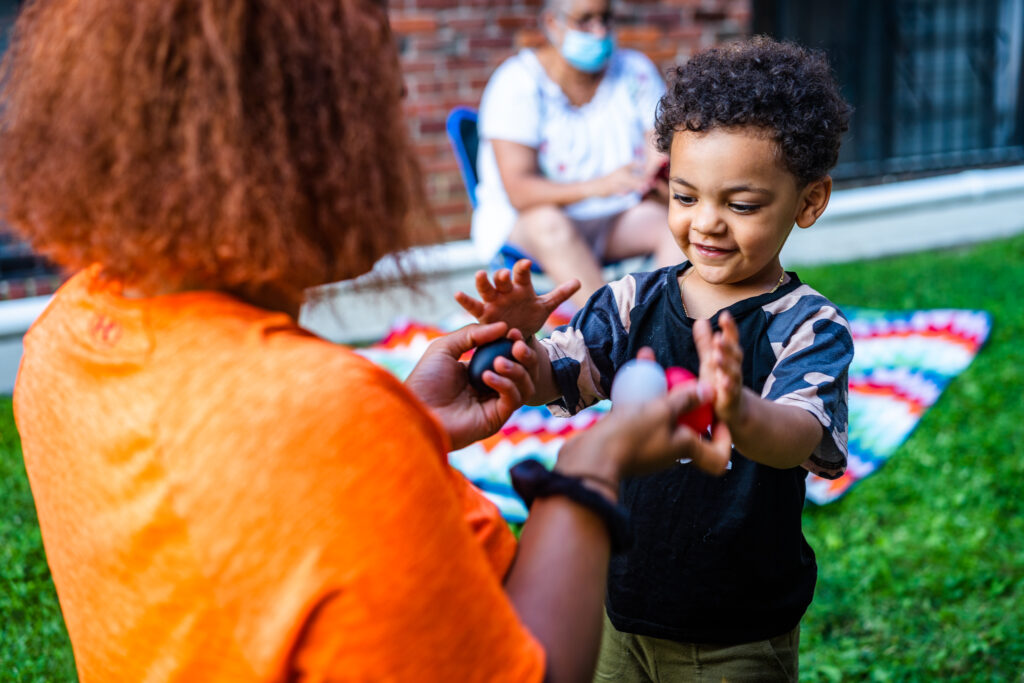Success! One Mom’s Answer to a Horrible Choice
Jackie was facing a terrible dilemma. Starting full-time work in healthcare shortly after giving birth to her son Remi was challenging, but she awoke each day focused on caring for her newborn and holding onto their one-bedroom apartment. Despite her hard work and resilience to sustain her housing, the apartment’s location and condition were becoming an obstacle to Jackie and her son living safely and securely. Jackie faced an impossible choice: to feel unsafe in the apartment she worked so hard to afford or seek shelter elsewhere. The time, energy and financial resources that either choice would take were daunting. With no family nearby, she asked her Boston Children’s Hospital pediatrician for help.
The doctor referred Jackie to FamilyAid and we immediately placed her in our crisis shelter and supports services program to help families quickly reset and get to safety.
During their short stay in our temporary housing, FamilyAid our case managers worked with Jackie to secure an affordable, safe and permanent home.
“Families in our program simply need temporary shelter and some assistance to find permanent housing,” says FamilyAid Senior Program Coordinator Salihah Hanson. “Unlike traditional shelter programs where families often stay for 18 months or more, the average stay in our crisis shelter is about three months, as families just need time to save some additional money, find another job or locate a place to live permanently. “
Funded for the next two years through a one-time grant from Jeff Bezos’ Day 1 Families Fund, the state-of-the-art crisis program and shelter focuses on providing housing and social services to a whole family so they can achieve self-sufficiency. Dedicated case managers work diligently with families as soon as they begin their temporary shelter stay, laying out plans to move them quickly from a housing crisis to a home while addressing children’s developmental needs.
“From our first introduction to a family, we focus on both their needs and their strengths,” says Hanson. “By providing our clients with dignity, respect, expertise, and resourcefulness, they remain highly motivated to get back up on their feet as quickly as possible.”
Hanson shared that support of families’ overall health is central to the success of the program. “When clients arrive, their temporary unit is clean, organized, and comfortable. Having to make so many decisions on top of worrying about basic needs such as food and shelter can be debilitating, so we make sure our families have laundry detergent, personal care products, a full fridge, dishes and utensils, and cleaning products, all distributed by our facilities team. Our families are resilient, and they just need a bit of extra support to help them succeed.”
“Typically, when I show a family their unit, parents are relieved to see a comfortable, supportive environment, where kids have the space to learn and time to play and be kids,” Hanson continued. Children have the comfort of sleeping in their own bed and parents can take a breath and focus with us on the challenging process of finding permanent housing.”
The crisis shelter program has an 80% success rate, helping mothers and children become permanently housed after four months or less in the program.
“I needed help,” says Jackie. “Before this crisis shelter program, I felt I was putting my family in danger. I am so thankful to have a safe place where we can feel secure and focus on the future.” She and Remi will move into permanent housing this month and continue the path to self-sufficiency and success.



